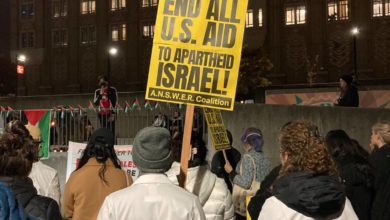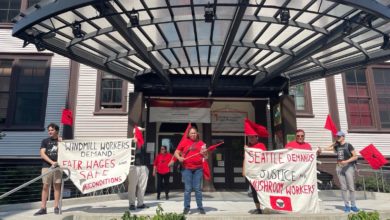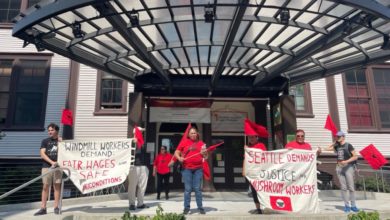Early in the morning of Sept. 22, homeless activists and their supporters gathered from four different sites in King County, Wash., then caravanned and converged on a site in South Seattle to launch “Nickelsville.”
|
Nickels claims to be spearheading a “10-year plan to end homelessness.” To that end, he has directed the city police and maintenance workers to clear outdoor encampments. Several times in the past year, city workers have dismantled large encampments and confiscated the personal property of camp residents. One man, Isaac Palmer, was run over and killed during a “sweep.”
In response to the sweeps, activists held several protest camp-outs at City Hall and then began planning for the rollout of Nickelsville.
This reporter went to one of the gathering sites at Tent City 3, currently located at Prince of Peace Lutheran Church in Shoreline. The Tent Cities in King County are sponsored by a non-profit organization, SHARE/WHEEL and are hosted by faith communities on a rotating basis. At TC3, we loaded up 150 bright pink tents into a van, and then shuttled people to the Nickelsville site in south Seattle. At the site, we unloaded the tents, greeted people coming from the other three sites, and began setting up the tents.
The site is in an industrial area behind a park-and-ride lot and is owned by the Duwamish Native American tribe. Despite this fact, the city claims the property belongs to the Department of Transportation and is already threatening to evict the residents.
“We’ll treat it like we will any other encampment, and that is, we’ll post it and we’ll let people know that this is inappropriate to be sleeping in an encampment that’s not authorized,” said Mayor Nickels.
There has been a 15 percent increase in the number of people sleeping outdoors in Seattle in the past year. That figure is based on a “one-night count” done when the present financial crisis was only beginning to raise its head. While homelessness in Seattle soars, shelter bed numbers remain static—in other words, the city’s policy against encampments effectively criminalizes being homeless.
On the Nickelsville website, organizers explain: “Sleeping outside is dangerous; unfortunately there are not enough indoor shelters. There is safety in numbers, there is power in being organized. … Mayor Nickels’ edict to systematically drive people out of their encampments and to destroy their property was the trigger for the present crisis. It is only befitting that our shantytown be named in honor of Mayor Nickels and his ‘humane’ treatment of the homeless.”
For the “Nickelodeons,” as the Nickelsville residents call themselves, founding the shantytown means standing up and claiming their rights as human beings in the face of dehumanizing city policies and anti-homeless prejudice promoted by the city and the media.
As I picked up my passengers at Tent City 3 on our way to Nickelsville, I could not help but notice that across the street from the church is almost an entire city block of mostly empty town-homes being offered for sale. There is no shortage of available housing in Seattle; what is in short supply is affordable housing. Those town-homes facing a homeless camp are empty—not because there are no people in need of them, but only because they cannot be sold for a profit. Being homeless is not a crime; the crime is the capitalist system that creates homelessness and poverty in the midst of plenty.







